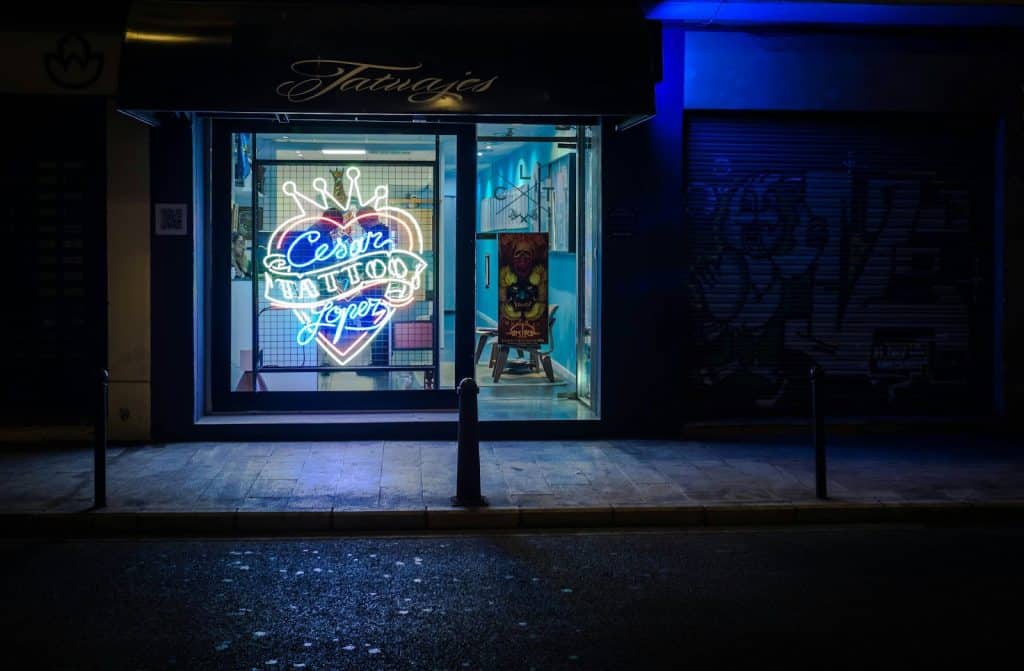Whether you’re an experienced tattoo artist ready to open your own place or an entrepreneur looking to get into an exciting industry, running a tattoo studio is about more than just good art.
It takes a mix of creative thinking, smart business sense, and great skills in dealing with people.
A top-notch tattoo studio attracts not only talented artists and happy clients – it also keeps things professional with top safety and cleanliness.
In this guide, we’ll share key tips on how to handle the everyday tasks of your studio, make clients feel welcome, and manage the tricky parts of the tattoo business.
1. Find the Right Location

When it comes to finding the right place to open your tattoo studio, it’s important to keep these things in mind:
Foot Traffic
Not all studios are walk-in studios, but if you’re new to the industry or don’t have a long list of clientele who will seek you out when they want to get tattooed, making sure your studio is visible to passersby is important for advertising your services.
Placing a studio where your potential clients are most likely to hang out can be extremely helpful. Look for open spaces near restaurants and bars, artsy areas in the city, near piercing studios, and more.
Surrounding Establishments
Beyond being visible, there are also surrounding establishments that can boost your business. For example, cities with military bases or universities tend to have a higher population of young people with a little extra money to spend who are very likely to be interested in getting tattooed.
Zoning
Your location needs to be placed within city zoning laws for tattoo parlors. For example, you have to be in a commercial zone (non-residential), and many cities have regulations about how far you need to be away from churches or schools.
2. Getting Licensed and Inspected

When opening a new tattoo studio, it’s important to be in contact with your local authorities to get your space inspected and licensed before operating.
Business Application
To start a tattoo studio, you have to legally open a business. Whether you chose to create an LLC or open your studio as a Sole Proprietorship, you need to be registered as a business to comply with tax laws.
Insurance
Your studio should be safe and clean according to all health protocols…but tattoo studios do present a certain amount of risk that retail businesses or other types of art studios don’t. (For example, while it’s unlikely in general, it is more likely for someone to need medical assistance during a tattoo than during a shopping trip.) For this reason, it’s very important to have a business insurance package that incldues liability insurance.
Waivers
Every client that comes through your studio will need to sign a release form, giving their consent to being tattooed. The health inspector will look for these in your shop before you open and will ask for them every time they come in for periodic inspections after your studio is up and running.
Claim Your Social Media Handles
Posting on social media is an important form of marketing for your business. Make sure to go ahead and claim your studio name on all social media platforms.
License Application
Your local government will require you to submit a “Tattoo Establishment” application. This will include the address (which is why it’s important to check in about zoning before signing a lease), as well as plans for your shop layout.
The shop layout will need be approved, including any renovations you plan to make to the space.
Inspection
Before you can begin taking clients, your shop will be inspected. You can download a complete checklist from your government’s website; it will let you know how many supplies you need to have at each station (needles, disposable grips, etc.), what cleaning supplies are required to sterilize your shop, as well as what needs to be included in an emergency spill kit.
For safety purposes, you must have non-porous flooring, sinks that have the ability to run hot water, and a safe place to dispose of used needles.
Autoclaves
You have two options for keeping a sterile work environment. You can have a “full disposable” shop, which means you use single-use grips on your tattoo machines that are removed with the rest of the biohazardous waste in the studio. Or, you can use an autoclave to sterilize grips between clients. If you use an autoclave, you will be responsible for performing a spore test every week and sending it to a third-party lab to be tested for safety.
3. Finding Artists
When it comes to finding artists to work in your studio, you can post on local job boards, in Facebook groups for tattoo artists in the area, or ask around at tattoo conventions.
Here’s a sample post of what to say. (This will also give you a good indication of what perks artists are looking for in a studio. Make sure you’re prepared to provide everything listed, or make changes as needed.)
I’m looking for tattoo artists to join my tattoo shop, [name here], located at [address]. As an artist at [tattoo shop name], you get:
- $1000 signing bonus
- Guaranteed $850/wk income (or I’ll pay you out of my own pocket)
- All disposables supplied
- All bookings handled by a counter person
- 7 sick days a year and 2 weeks paid vacation
- 60% split
Contact me at [email] for further details and to submit your portfolio.
Make sure to look at their portfolio, as well as their online presence, to make sure you hire high-quality tattoo artists who know how to tattoo safely. Look for a mention of them going through an apprenticeship or a comprehensive online tattoo course as part of their education.
4. Finding Clients

Getting clients to walk through the door can be a daunting task at first. However, offering special deals (and advertising it heavily through signage and social media) can help get those first clients through the door.
It’s a good idea to start advertising the studio before it’s open, and then having a special launch party for the studio on the first day you’re officially open for business.
Final Thoughts
Running a tattoo studio is an exciting challenge that mixes creativity with smart business practices.
A great tattoo studio is more than just about making art—it’s also about making a safe and welcoming place for artists and clients. Paying attention to details, like keeping the studio clean and treating clients well, is key.
As you go forward, stay open to new trends and ways to improve your studio’s operations. With hard work and a focus on quality, your tattoo studio can become an established hot shop known for top-notch tattoos.




